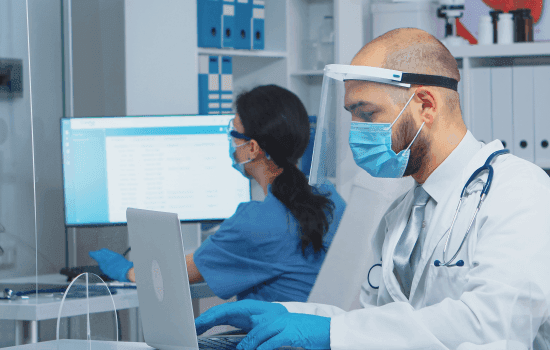
Healthcare Portals Benefit Hospitals and Patients
Significant technological breakthroughs in recent years have prompted the healthcare sector to explore novel solutions with the dual goals of better patient care and greater operational efficiency.
A healthcare portal is one answer. It is a one-stop solution from where you can access and manage all your medical records and history. An efficient healthcare solution is like a helping hand for hospitals to manage multiple patients from any place. Healthcare portals have the potential to revolutionize the healthcare system by putting patients at the center of treatment and increasing efficiency.
This blog will look at how healthcare portal development may help hospitals and their patients.
Understanding Healthcare Patient Portal for better healthcare needs
The Healthcare portal provides patients with 24/7 access to a dedicated, password-protected website area. Clients may come here for help with a wide range of healthcare issues, such as accessing and organizing medical records.
Improved communication between patients and healthcare providers is the primary objective of patient portals. Besides that, it allows the patients to use it to make appointments with their doctors, communicate with those doctors, and get health-related information. In turn, medical professionals can easily access their patient's diagnostic data.
How does Implementing the Healthcare Portal development benefit both Patients and doctors?
Both patients and doctors may gain from using patient portals. Health outcomes, patient satisfaction, and healthcare efficiency may all increase due to these advantages. Key benefits of healthcare portals include:
Privacy of Medical Records
Patients have convenient, anytime access to their health records, lab results, and other relevant data through patient portals. A patient's medical records are available for review, including tests, diagnoses, treatments, allergies, vaccines, and more. Patients with access to this data can better take charge of their healthcare, better understand their diseases, and engage in treatment.
Easy-to-Use Methods of Contact
Patient portals allow patients and doctors to exchange private information safely. Patients may communicate with their medical staff and obtain answers to their inquiries, medication refill requests, and general medical advice. Asynchronous communication benefits patients and doctors by reducing the need for in-person meetings and phone conversations.
Refilling a Prescription
Electronic medication refill requests are made possible via patient portals. This saves the patient time and effort by reducing the need for follow-up calls or visits to the doctor's office. Customers may check the status of their prescriptions, ask for refills, and be notified when their drugs are available for pickup or delivery.
Access to healthcare terms at ease
Articles, movies, and connections to trustworthy health websites are educational content available via patient portals. Patients may take charge of their health with the knowledge, self-care strategies, and preventative steps provided by these materials. Patients' access to information about their diseases, treatment alternatives, and healthy lifestyle choices encourages active participation in one's care.
Test Summaries and Laboratory Reports
Patient portals provide easy access to diagnostic imaging and laboratory findings. Patients may go through their findings to learn more about their health. Access to test results promptly improves communication with healthcare practitioners, allows for earlier action if needed, and increases patient knowledge and participation in treatment.
Customized Reminders to Maintain Health
Preventive screenings, vaccines, and follow-up visits may all be reminded of using patient portals. Patients are more likely to get timely treatments and preventative care when reminded of their healthcare requirements.
Safe and sound data transfer
Security and privacy are top priorities in patient portals, so they use encryption and two-factor authentication. This protects the privacy and security of the patient database. Patients are more likely to actively utilize and interact with the portal if they have faith in the system, thanks to the sharing of secure data between themselves and their healthcare providers.
Healthcare on Demand through the Internet
Patient portals provide remote access to healthcare services, especially when in-person visits are difficult or impossible to implement. Healthcare access is enhanced, and obstacles to treatment are decreased by allowing patients in rural or distant places to interact with healthcare practitioners, have virtual consultations, and access critical healthcare resources.
Streamlined Governmental Procedures with Healthcare Portal Solution
Both hospitals and patients gain from the increased efficiency of administrative tasks made possible by introducing healthcare portal solutions.
Administration of Electronic Health Records (EHR)
Healthcare practitioners may view and update patients' data online thanks to portals that consolidate patients' medical information. This boosts efficiency, accuracy, and effectiveness in the delivery of healthcare.
Digital Signup and Payment Processing
The portal provides a one-stop shop for patient needs, allowing easy registration, profile updates, and bill payments. As a result, healthcare institutions may save time and money on paperwork and administration.
Medication Administration
Patients may examine their whole medication history in one place using their healthcare portal. The process of reordering medicine is streamlined, and patient safety and compliance with their prescribed regimen are enhanced.
Process of healthcare portal development
To determine the scope and functionality of the portal, it is necessary to understand the objectives and goals of the healthcare organization and patients via a requirement analysis.
Integration of functionality like appointment scheduling, access to medical information, and secure messaging require the development of the portal using suitable programming languages and frameworks.
Ensure the site works as expected and upholds quality standards by thoroughly testing to find and repair errors.
Set up the portal on a safe server and adjust its settings to protect user information and comply with all applicable laws.
Check the portal often to fix bugs or security holes and add new functionality in response to user suggestions.
Conclusion
Healthcare portal development is not just another technology gift; it has become necessary for businesses to meet all customers' healthcare needs.
From better information tracking, advanced care, and less paperwork to better affordability has made it a go-to choice for all healthcare centers. These advantages help hospitals run more smoothly and efficiently, allowing patients and the healthcare system as a whole.
Appreciate the creator